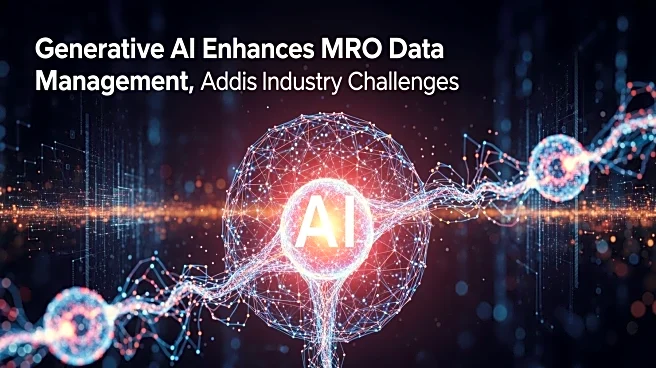What's Happening?
The Maintenance, Repair, and Overhaul (MRO) sector is experiencing a technological shift with the integration of generative artificial intelligence (AI). At the MRO Europe 2025 conference, industry leaders
discussed how generative AI can bridge technological gaps in MRO operations, which have historically suffered from under-investment. Laura Garnett from Boeing Global Services highlighted the potential of generative AI to connect disparate data systems, reducing friction and enhancing insights. Ben Jacob, CEO of Zimbly, emphasized the role of large-language models (LLMs) in handling unstructured data, while Jan Stoevesand from Lufthansa Technik pointed out the necessity of improving data quality for effective AI implementation. The panel agreed that generative AI could transform MRO data management, but stressed the importance of addressing existing data quality issues.
Why It's Important?
The integration of generative AI in MRO operations is significant as it promises to enhance data management and operational efficiency. By improving data connectivity and quality, AI can streamline processes, reduce downtime, and optimize maintenance schedules. This technological advancement is crucial for the aviation industry, which relies heavily on precise and timely maintenance to ensure safety and operational reliability. Companies that successfully implement AI-driven solutions stand to gain a competitive edge by reducing costs and improving service delivery. However, the success of these initiatives depends on overcoming data quality challenges, which requires industry-wide cooperation and investment.
What's Next?
The next steps for the MRO sector involve addressing data quality issues to fully leverage generative AI capabilities. Industry stakeholders are expected to collaborate on improving data standards and interoperability. As AI tools become more integrated into MRO operations, companies may need to invest in training and infrastructure to support these technologies. Additionally, ongoing discussions and developments in AI applications are likely to continue at industry conferences and forums, driving further innovation and adoption.
Beyond the Headlines
The adoption of generative AI in MRO operations could lead to broader implications, such as shifts in workforce dynamics and the need for new skill sets. As AI takes on more data management tasks, human roles may evolve to focus on strategic decision-making and oversight. Ethical considerations around data privacy and security will also become increasingly important as AI systems handle sensitive information. Long-term, the successful integration of AI could set new standards for efficiency and safety in the aviation industry.










